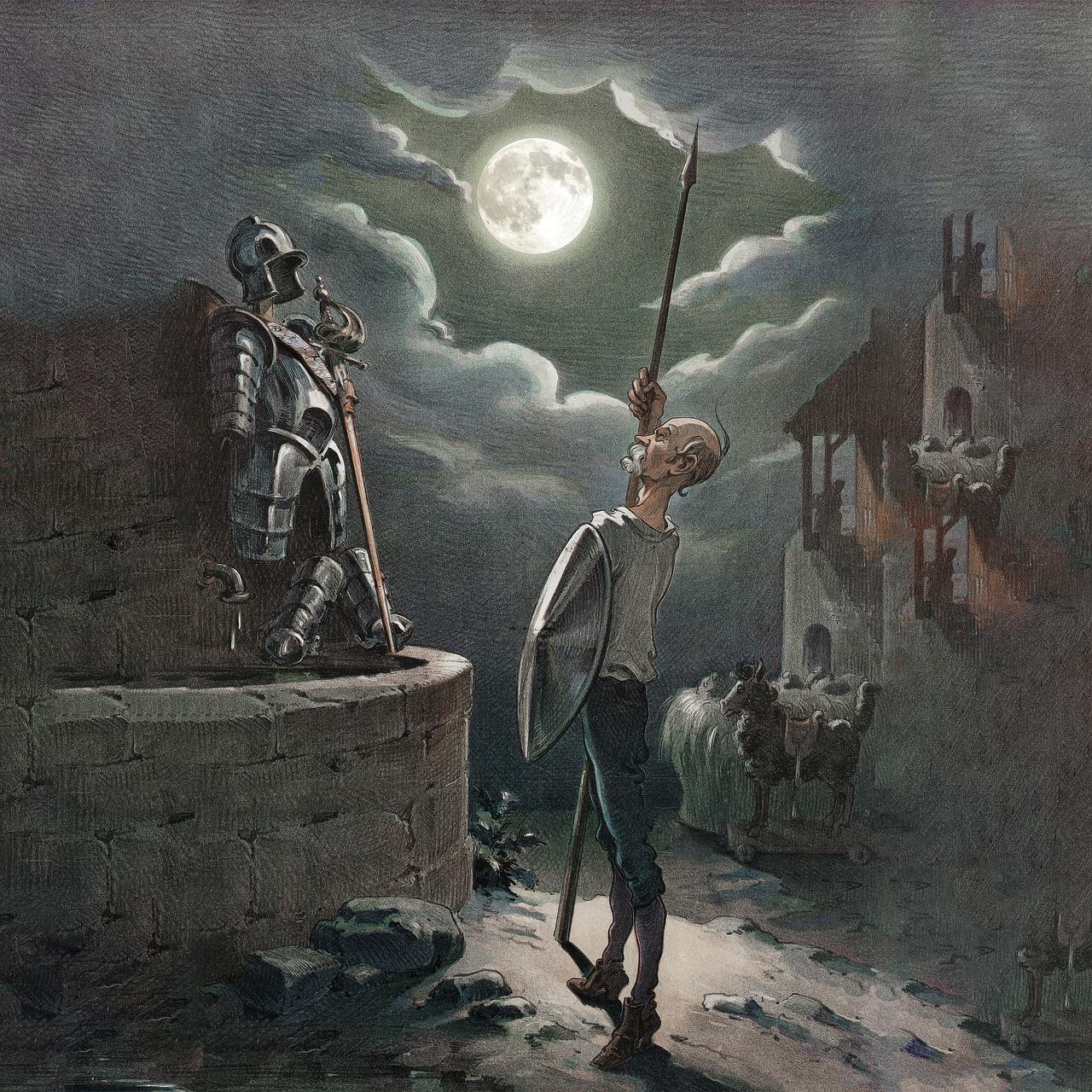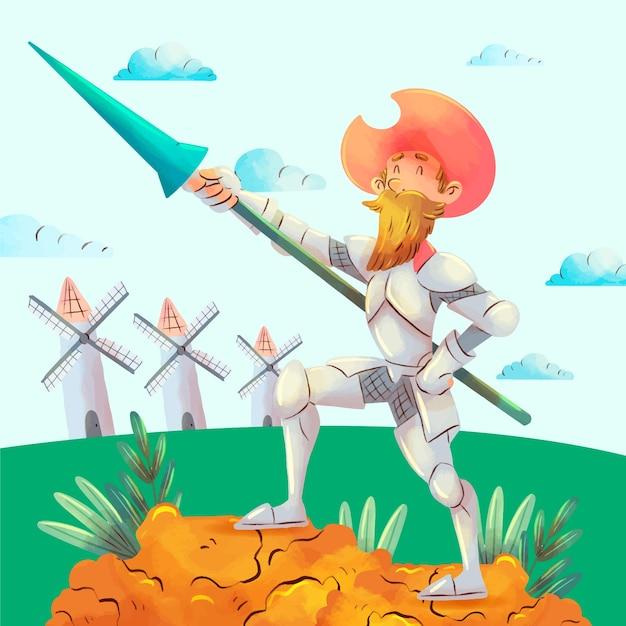Don Quixote, written by Miguel de Cervantes in the early 17th century, is a timeless masterpiece that continues to captivate readers with its intriguing blend of adventure, humor, and profound exploration of the human condition. In this blog post, we delve into the main theme of Don Quixote, shedding light on the essence of this enduring work.
Many scholars have debated over the primary theme of Don Quixote, but at its core, the novel revolves around the concept of idealism. Through the character of Don Quixote himself, a delusional but valiant knight errant, Cervantes examines the power of imagination and the pursuit of one’s dreams, even in the face of ridicule and despair.
Moreover, Don Quixote also serves as a critique of society and its often cruel treatment of individuals who dare to deviate from societal norms. Cervantes challenges readers to question the nature of reality and the perception of sanity, as Don Quixote’s encounters blur the lines between illusion and truth.
To better understand the main theme of Don Quixote, we explore the broader context of the novel and its connections to the musical adaptation, Man of La Mancha. This iconic musical, with music by Mitch Leigh and lyrics by Joe Darion, brings Don Quixote’s remarkable journey to life on the stage, immortalizing his adventures and inviting audiences to ponder the significance of chasing one’s own windmills.
Join us as we embark on a literary and musical journey, uncovering the profound message behind Don Quixote and Man of La Mancha, and discovering why this story of a misguided knight and his faithful donkey continues to resonate with audiences even in the year 2023.

What Makes Don Quixote Tick
Ah, Don Quixote, the iconic literary character who’s as famous for his imagination as he is for his inclination for tilting at windmills. But what lies beneath the surface of this chivalrous knight? In this subsection, we’ll delve into the main theme of Don Quixote and uncover the driving force behind his adventures. So put on your armor (figuratively, of course) and let’s embark on this literary journey!
An Insanity Called Idealism
One of the key themes of Don Quixote is the power of idealism. Don Quixote is not your average knight in shining armor; he’s a little… well, let’s just say eccentric. His mind is filled with tales of chivalry and honor, and he sees the world through the lens of these stories. In a society that has moved on from the age of knights and quests, Don Quixote remains stubbornly committed to his ideals.
Battling the Mundane
Don Quixote’s adventures can also be seen as a rebellion against the mundane. In a world that has become increasingly practical and utilitarian, Don Quixote longs for a bit of magic and romance. He refuses to accept the ordinary and instead seeks out opportunities for grand heroism. It’s as if he’s trying to inject a sense of wonder and adventure back into a world that has lost its spark.
The Power of Imagination
Imagination is another major theme running through Don Quixote. His mind is a battlefield of fantasy and reality, with the line between the two often blurred. Don Quixote’s vivid imagination allows him to transform everyday objects into mythical creatures and turn mundane situations into epic quests. His imagination is both a blessing and a curse, fueling his adventures but also leading him into the realm of delusion.
The Search for Meaning
Underlying Don Quixote’s quests and escapades is a quest for meaning. Despite the ridicule and laughter he receives from those around him, Don Quixote believes in the importance of his adventures. He seeks to find purpose in life, to leave a legacy beyond the confines of his small village. In his pursuit of noble deeds, Don Quixote is in search of a greater purpose that transcends the humdrum of everyday existence.
A Tale for the Ages
And there you have it, the main themes of Don Quixote encapsulated in all their quixotic glory. Idealism, rebellion against the mundane, the power of imagination, and the search for meaning all intertwine to create the captivating world of Don Quixote. So, the next time you find yourself daydreaming or caught up in a flight of fancy, remember the knight who tilted at windmills and reflect on the lasting impact of Cervantes’ timeless masterpiece.
Note: As an AI, I am not capable of personal opinions or experiences. The above content is generated based on commonly known information about Don Quixote.

FAQ: What is the main theme of Don Quixote
What is the theme of Man of La Mancha
The theme of “Man of La Mancha” revolves around the power of imagination and the pursuit of ideals. It explores the concept of creating your own reality and finding beauty and nobility in a world that may seem bleak and mundane.
What is the message of Don Quixote
Don Quixote’s message can be interpreted in various ways, but at its core, it emphasizes the importance of holding onto one’s dreams and ideals, regardless of the cynicism and skepticism of the world. It champions the idea that even in the face of adversity, it is essential to remain true to oneself and strive for the betterment of society.
Who wrote the music to Man of La Mancha
The music for “Man of La Mancha” was composed by Mitch Leigh, with lyrics by Joe Darion. Together, they created a memorable soundtrack that perfectly captures the essence of the story.
What was Don Quixote’s donkey
Don Quixote’s loyal companion is not a donkey but a horse named Rocinante. However, Sancho Panza, Don Quixote’s faithful squire, does ride on a donkey throughout the story.
Is Man of La Mancha a musical
Yes, “Man of La Mancha” is indeed a musical. It first premiered on Broadway in 1965 and has since become a beloved classic of the genre.
Who is Don Quixote, and what is his role
Don Quixote is the main character in the novel “Don Quixote” and the musical “Man of La Mancha.” He is a middle-aged nobleman who becomes obsessed with the chivalrous ideals of knights-errant. Donning rusty armor and renaming himself as “Don Quixote,” he embarks on various adventures, upholding honor, defending the helpless, and seeking to fulfill his lofty quest.
What genre is Man of La Mancha
“Man of La Mancha” falls under the genre of musical theater. It combines elements of both drama and comedy, with poignant songs and captivating storytelling.
Did Peter O’Toole sing in Man of La Mancha
In the film adaptation of “Man of La Mancha,” Peter O’Toole portrayed the character of Don Quixote but did not sing. The singing voice for Don Quixote was provided by Simon Gilbert.
What is the main theme of Don Quixote
The main theme of Don Quixote revolves around the power of imagination and idealism, juxtaposed with the harsh realities of the world. It explores the human desire to escape mundane existence and find purpose and meaning through the pursuit of noble quests.
What is the story of Man of La Mancha
“Man of La Mancha” tells the story of Miguel de Cervantes, a poet and playwright, who, while imprisoned during the Spanish Inquisition, acts out the story of Don Quixote for his fellow inmates. As Cervantes takes on the role of Don Quixote, the audience is transported into a world of fantastical adventures, inspiring songs, and a poignant exploration of the human spirit.
